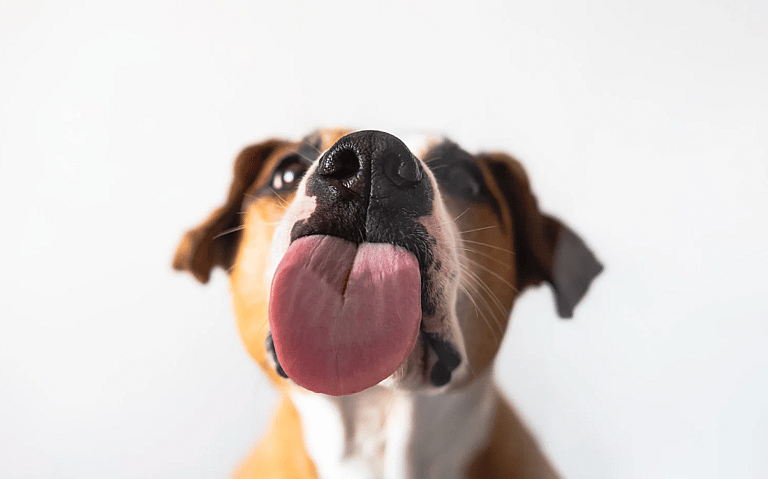Why is My Dog Licking the Air? Vets and Trainers Explain
Ever caught your dog licking the air—especially at night—and wondered what’s going on? While it might seem odd or harmless, this behavior can sometimes point to something more serious. In this post, we’ll break down the possible causes and share expert advice from vets and dog trainers on what it might mean and how to help. (Check out the video above to see what air licking looks like!)
Possible Causes of Air Licking

1. Medical Issues
One of the primary reasons a dog might lick the air is due to underlying medical conditions. According to Dr. Henry Pasternak, a holistic veterinarian in Los Angeles, “Air licking can be a sign of gastrointestinal distress. Dogs with acid reflux, nausea, or other stomach issues might lick the air in an attempt to soothe their discomfort.” Other medical issues to consider include:
- Esophagitis: Inflammation of the esophagus, often caused by acid reflux or other irritants.
- Foreign Objects: A stuck object in the mouth or throat can cause discomfort leading to air licking
- Allergies: Environmental or food allergies can cause oral discomfort, prompting air licking
- Seizure Disorders: Partial seizures can result in repetitive behaviors like air licking
- Dental Problems: Issues like periodontal disease or a toothache might lead to air licking as a way to alleviate pain
2. Neurological Disorders
Air licking can sometimes be a sign of a neurological disorder. Dr. Heather Skinner, a veterinary behaviorist in Spokane, notes that “compulsive air licking can be related to a condition called partial seizure disorder. These seizures can manifest in repetitive behaviors, such as air licking.” If your dog exhibits other unusual behaviors or seems disoriented, it’s essential to consult a veterinarian for a thorough neurological examination

Neurological disorders, including partial seizure disorder, can lead to various unusual behaviors in dogs. Partial seizures, also known as focal seizures, occur when abnormal electrical activity is confined to one area of the brain. Unlike generalized seizures, which affect the entire brain, partial seizures can manifest in localized, repetitive movements.
According to Dr. Skinner, “Signs of partial seizures in dogs may include snapping at the air, licking the air, or even fly-biting behavior where the dog appears to be biting at imaginary flies.”
These episodes can last for a few seconds to several minutes and may be followed by a period of disorientation or confusion. Diagnosing partial seizures often requires a detailed medical history, neurological examination, and sometimes advanced imaging techniques like MRI to identify the underlying cause and tailor an appropriate treatment plan.
3. Behavioral Issues
Sometimes, air licking is a behavioral issue. Dogs might lick the air out of anxiety or boredom. Certified dog trainer Brad Tedeschi, suggests that “anxiety can trigger repetitive behaviors in dogs, much like it can in humans. If your dog is stressed or anxious, they might lick the air as a coping mechanism.” Boredom can also lead to air licking. “Dogs need mental and physical stimulation,” says Tedeschi. “Without enough exercise or enrichment activities, they might resort to behaviors like air licking to pass the time”
Solutions and Management
Addressing the issue of air licking involves identifying the root cause and taking appropriate action. Here are some steps to consider:

1. Visit the Veterinarian
The first step in addressing air licking is to rule out medical issues. Schedule a visit to the veterinarian to check for gastrointestinal problems, dental issues, or neurological disorders. A thorough examination can help pinpoint the cause and determine the best course of treatment
2. Behavioral Modification
If medical issues are ruled out, consider behavioral modification techniques. Stilwell recommends increasing your dog’s mental and physical stimulation. “Interactive toys, puzzle feeders, and regular exercise can help reduce boredom and anxiety,” she advises. “Training sessions and obedience classes can also provide the mental stimulation dogs need”
3. Anxiety Management
For dogs with anxiety-related air licking, creating a calming environment is crucial. Dr. Becker suggests using natural remedies such as pheromone diffusers, which can help reduce anxiety. “Additionally, providing a safe space for your dog, such as a cozy bed or crate, can make them feel more secure,” she adds.
4. Consult a Behaviorist
In cases where air licking persists despite your efforts, consulting a professional dog behaviorist might be necessary. A behaviorist can work with you to develop a tailored plan to address your dog’s specific needs
Crowdsourcing the Problem!
We also took to social media to see if anyone else’s dog has had this issue and got a whole range of responses

While air licking can be a perplexing behavior, understanding the potential causes and seeking expert advice can help you manage it effectively. Whether it’s a medical issue, a neurological disorder, or a behavioral problem, there are solutions available to help your furry friend. Regular veterinary check-ups, increased mental and physical stimulation, and anxiety management techniques can go a long way in ensuring your dog’s well-being. As always, consult with your veterinarian or a professional dog behaviorist to address any concerns and find the best approach for your pet.




